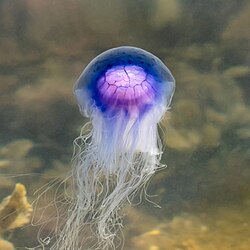Blå brandmand
| Blå brandmand | |
|---|---|
 Blå brandmand,Brofjorden, Sverige | |
| Videnskabelig klassifikation | |
| Rige | Animalia (Dyr) |
| Række | Cnidaria (Nældecelledyr) |
| Klasse | Scyphozoa (Storgopler) |
| Orden | Semaeostomeae |
| Familie | Cyaneidae |
| Slægt | Cyanea |
| Art | C. lamarckii |
| Videnskabeligt artsnavn | |
| Cyanea lamarckii Péron & Lesueur 1810 | |
| Hjælp til læsning af taksobokse | |
Blå brandmand (Cyanea lamarckii) tilhører gruppen af storgopler ligesom den almindelige røde brandmand. Den har tentakler med nældeceller med gift, der ved berøring udløses og derefter brænder offeret. Den blå brandmand er forholdsvis sjælden ved de danske kyster, men forekommer dog i mindre tal i perioden maj – september. Den kan generelt findes fra Biscayen til Island, men er mest almindelig på sydvestkysten af Storbritannien og i den sydlige del af Nordsøen.
Brandmanden kan blive op til 30 cm i diameter, men bliver sjældent større end omkring 15 cm i Danmark. Dyrets klokkeformede krop er en smule mere hvælvet end slægtningen den røde brandmands. Herudover adskilles de to arter lettest på størrelsen og farven, da den blå brandmands kropshule er farvet stærkt blå evt. med stænk af orangegult.
Medusestadiet, som vi kender som brandmanden, lever pelagisk, mens polypstadiet fæstnes på bunden, muligvis omkring de britiske øer og i den sydlige del af Nordsøen. Afsnøring af meduseformerne fra den fastsiddende polyp sker i perioden januar – marts.
Kilder/Eksterne henvisninger
- Vattenkikaren: Cyanea lamarckii Arkiveret udgave fra 2007.
Medier brugt på denne side
Forfatter/Opretter: W.carter, Licens: CC BY-SA 4.0
Sideview of a contracted bluefire jellyfish (Cyanea lamarckii) in Brofjorden at Sandvik, Lysekil Municipality, Sweden. The jellies at this photo shoot were about 6–12 cm (2.4–4.7 in) in diameter. The blue jellies are streamlined when contracted, and the rim of their top is very lobed so when they expand to get ready for a "swim stroke", they get little resistance from the water until they are fully expanded and ready to contract again. That makes them more agile, quicker and faster swimmers than Cyanea capillata and Aurelia aurita. Their darting movements in the water are more resembling that of dragonflies than other jellies.
Forfatter/Opretter: W.carter, Licens: CC BY-SA 4.0
Underside of an expanded bluefire jellyfish (Cyanea lamarckii) in Brofjorden at Sandvik, Lysekil Municipality, Sweden. The jellies at this photo shoot were about 6–12 cm (2.4–4.7 in) in diameter. The blue jellies are streamlined when contracted, and the rim of their top is very lobed so when they expand to get ready for a "swim stroke", they get little resistance from the water until they are fully expanded and ready to contract again. That makes them more agile, quicker and faster swimmers than Cyanea capillata and Aurelia aurita. Their darting movements in the water are more resembling that of dragonflies than other jellies. Most of the little dots in the photo are out-of-focus daphnias. A sharper one can be seen almost at the center bottom of the tentacles.
Forfatter/Opretter: W.carter, Licens: CC BY-SA 4.0
Bluefire jellyfish (Cyanea lamarckii) in Brofjorden at Sandvik, Lysekil Municipality, Sweden. The jellies at this photo shoot were about 6-12 cm in diameter. The blue jellies are streamlined when contracted, and the rim of their top is very lobed so when they expand to get ready for a "swim stroke", they get little resistance from the water until they are fully expanded and ready to contract again. That makes them more agile, quicker and faster swimmers than Cyanea capillata and Aurelia aurita.
Forfatter/Opretter: W.carter, Licens: CC BY-SA 4.0
Bluefire jellyfish (Cyanea lamarckii) in Brofjorden at Sandvik, Lysekil Municipality, Sweden. The jellies at this photo shoot were about 6-12 cm in diameter. The blue jellies are streamlined when contracted, and that makes them more agile, quicker and faster swimmers than Cyanea capillata and Aurelia aurita.
Forfatter/Opretter: Ecomare/Oscar Bos, Licens: CC BY-SA 4.0
blue jellyfish (Cyanea lamarckii)








